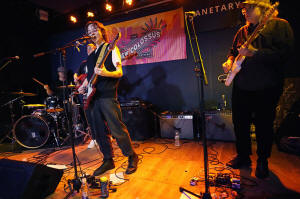Visa fee hikes and delays hinder international artists from touring the
United States
[March 15, 2025]
By MARIA SHERMAN
NEW YORK (AP) — In New York City, spirited badge-holders and independent
music fans wove in and out of 150-person capacity clubs filled with
groups from around the globe.
A Japanese rock band opened for a German post-punk trio followed by an
alternative group from New Zealand. And that was just day one at the New
Colossus Festival, held last week.
The six-day event takes its name from the poem cast on the Statue of
Liberty, viewed as a welcome message for new immigrants: “Give me your
tired, your poor, Your huddled masses….”
Now in its sixth year, 196 artists were scheduled to perform, more than
half from outside the United States. But New Colossus may be an
exception, not the rule, for international artists hoping to perform in
the U.S. In the last few years, the process has grown much more arduous
and expensive.
“It’s already at the maximum level of difficulty that we can
rationalize,” said Mischa Dempsey, frontperson for the thrilling
Montreal band Knitting, who performed at New Colossus and described the
process as “labor intensive.”
“I can’t even think about it getting worse.”
How did we get here?
On April 1, 2024, the USCIS introduced a visa fee increase, raising the
cost from $460 to over $1,615 per musician application, the first bump
since 2016. According to the USCIS website, the increase allows the
organization to “recover our operating costs more fully and support
timely processing of new applications.”

Nearly a year later, “we are seeing the opposite,” immigration attorney
Gabriel Castro said. “We are seeing cases actually slow down.”
The USCIS did not respond to an email from the AP.
Visa processing times slow
Changes to the system have caused delays. According to Tamizdat, a
nonprofit that advocates for international artist mobility, all visa
petitions are now filed through a centralized service center in Texas
and are randomly divvyed up to preexisting California and Vermont
service centers.
The result has been slowed processing times. Matthew Covey, an
immigration attorney and Tamizdat's executive director, says Vermont has
gone from one month to three. In California, it previously took two to
four months, but now, it's eight.
“Nobody’s filing petitions long enough in advance to sustain an
eight-month delay,” says Covey. “You got a 50/50 chance of it being done
in a reasonable amount of time or having to pay an extra $2,800 to
expedite it.”
Castro says small and mid-tier artists don’t have the luxury of spending
nearly $3,000 on expedited processing or booking tour dates eight months
in advance. “And you have to have those tour dates before you apply for
the visa," he adds.

“It’s just more expensive than ever to try and do a tour in the U.S. And
that’s a problem,” says Jen Jacobsen, executive director at The Artist
Rights Alliance. “And I wouldn’t say the fee change by itself has had
the impact — it’s a combination of inefficiencies and delays.”
Are international artists avoiding the U.S.?
The headlines are frequent: The K-pop group KARD canceled its 2025 U.S.
tour due to visa issues. So did the Canadian metal band Respire. The
up-and-coming Swedish rapper Bladee delayed his 2024 tour for similar
issues. In the film world, Iranian co-directors Hossein Molayemi and
Shirin Sohani took home an Oscar for their animated short, “In the
Shadow of the Cypress” — after arriving in Los Angeles just hours
before, due to visa delays.
All international musicians require work authorization to perform in the
U.S. There are scarce exemptions available to only a few, like the Visa
Waiver Program, which is often used at South by Southwest.
“The safest approach is always to get a ... visa,” says Castro.

[to top of second column]
|

The band knitting perform during The New Colossus Festival on
Friday, March 7, 2025, in New York. (Photo by Charles Sykes/Invision/AP)
 Jacobsen says “there’s definitely a
buzz about whether touring in the U.S. is still a good economic
option” for these artists.
“I’m hearing more and more frequently from artists who are just
like, ‘I’m going to take a break from the U.S. for a while. It’s not
a return on my investment. It’s not worth it,’” says Covey.
Who is most affected?
Delays and fee increases disproportionally affect “world music
artists, jazz, indie bands who are developing,” says Covey, as well
as “artists outside of Europe who have government support … if they
come in from the Global South, they generally are not going to have
a lot of government funding to cover these kinds of costs.”
New Colossus' lineups have benefited from governments who support
local artists. “Countries like Germany, England,Canada, France,
Ireland and Wales have funding bodies that the bands apply for,”
says Steven Matrick, one of the New Colossus Festival founders.
“They recognize our festival as a showcase festival. And the bands
get funded to come here by those bodies.”
But still, that does not make them immune to last-minute
cancellations. This year, artists from Ireland, Scotland and Italy
canceled. A band from Paraguay was held up by visa delays; they
arrived after their second scheduled performance straight from the
airport. Hiçamahiç, a band from Istanbul, had to cancel entirely.
In a statement, Hiçamahiç explained that two band members couldn’t
get visa appointments in time, despite working with an intermediary
agency. “The U.S. is currently issuing standard visa interview dates
for Turkish citizens nearly 1,000 days later, which feels like an
elitist form of discrimination. We are deeply disappointed by this
situation,” they wrote. “We don’t think we are any different from a
citizen of the U.K. or Germany.”
Matrick says, “We have probably 10 cancellations a year, with people
that don’t get the funding to purchase visas,” or their visas are
not processed in time.
Castro reminds that the loss of international talent stateside is
not just a cultural one, but economic. “It’s a loss for the venues
... the bars, the parking lots,” he lists.
Concerns under a new presidency
“Based on the last Trump administration, what we saw over the course
of the four years were increasing problems with consular process,”
Covey says. “The delay times increased. The number of errors
increased. Obviously, the scrutiny ... increased."
“We’re expecting that we will probably start seeing increased delays
in the visa processing at U.S. embassies," he adds. And in a period
of global conflict, “your indie rock band is really not priority.”
Castro said it is early to make predictions “of what this is going
to look like in the future ... But that doesn’t mean that changes in
immigration, generally, can affect these visas tangentially. The
slow-down in immigration processes is a slow down for everyone.”
“Some of the policies about clamping down on illegal immigration
sometimes flow into areas — unintended areas, perhaps — but areas
that can impact legal immigration,” says Jacobsen. “If we want a
rich palette of artistry to be here, we have to make it a welcoming
environment for them.”
There are other potential impacts: At the end of last month, the
U.S. government ordered a visa ban on transgender athletes looking
to enter the U.S. for sports events. “They’re just talking about
enforcing it on athletes, but it doesn’t take very much to imagine
them enforcing that on anyone,” says Covey. "I’m concerned that the
political agendas of the current administration could impact which
artists get visas and which don’t.”
Dempsey, of the band Knitting, said: “Three of us are gender
nonconforming and I think more than anything, we're scared of what
it’s going to be like in the States, what it’s going to be like to
cross the border."
All contents © copyright 2025 Associated Press. All rights reserved |